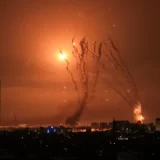Navigating Turbulent Skies – The U.S.-Israel Partnership Amidst Conflict
In the face of adversity, the strength of international alliances becomes increasingly apparent. As tensions continue to mount in the Middle East, Secretary of Transportation Pete Buttigieg affirmed the unwavering support of the United States for Israel and its commitment to ensuring safe travel in the region.
On a grim Saturday, Secretary Buttigieg reached out to Israeli Ambassador Michael Herzog to express solidarity and to discuss measures aimed at enhancing safety in the midst of an escalating conflict. In a tweet, Buttigieg made it clear: “America stands with the people of Israel, and we are working together to support safe travel in the region.”
This declaration of unity came in the wake of a harrowing weekend marked by a brazen attack launched by Hamas terrorists against Israel. The situation on the ground remained volatile, raising concerns about air travel safety in the region. In response, the Federal Aviation Administration (FAA) issued a Notice to Air Missions (NOTAM) cautioning pilots and operators about the “potentially hazardous situation in Israeli airspace due to the ongoing conflict between Israel and Gaza.”
Such proactive safety measures are essential to ensuring the well-being of passengers and crew members. As a result, several major U.S. carriers, including American, Delta, and United Airlines, chose to suspend flights to Israel until conditions improve. These decisions underscore the commitment of the aviation industry to prioritize safety above all else.
In this tense atmosphere, it is heartening to witness the U.S. Embassy in Jerusalem stepping forward to issue a safety alert for U.S. citizens in the region. The alert serves as a lifeline, offering crucial information to those seeking to navigate the complex and rapidly evolving situation. The embassy’s message lays out the reality of the situation: “There are active military operations in the Gaza periphery and Gaza, as well as rocket and mortar fire in the Gaza periphery.” These are the hard facts on the ground, and they cannot be ignored.
One of the immediate consequences of this turmoil is the closure of the Erez crossing between Israel and Gaza, heightening the need for alternative routes to safety. The U.S. Embassy wisely advises American citizens in Gaza to stay vigilant and explore the status of the Rafah Crossing into Egypt for a potential exit strategy.
The escalating conflict in the Middle East serves as a stark reminder of the fragile nature of peace in the region and the importance of maintaining strong international partnerships. In moments of crisis, it is the unity and cooperation between nations that can make a difference, as Secretary Buttigieg’s conversation with Ambassador Herzog underscores.
The situation in Israel and Gaza remains fluid and unpredictable. As we keep a watchful eye on these developments, it is vital that we continue to prioritize the safety and well-being of all those caught in the crossfire. The commitment of the United States to stand with Israel in this challenging time is a testament to the enduring bonds of friendship and alliance, reminding us that even in turbulent skies, cooperation and solidarity can guide us toward safer horizons.






